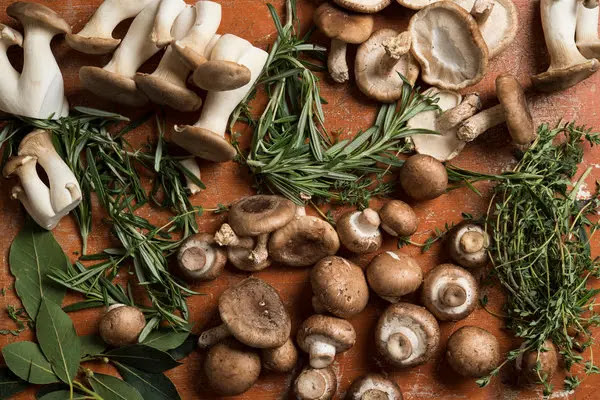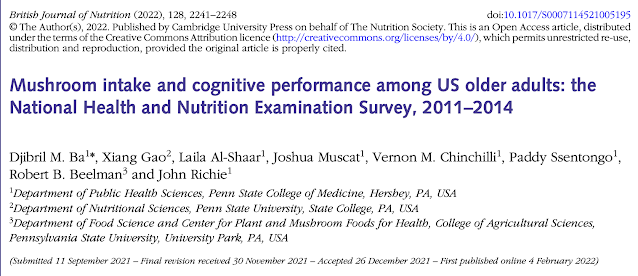Mushrooms May Prevent Cognitive Impairment, Reduce Dementia Risk After COVID-19 Infection

The most common type of dementia is Alzheimer’s disease. In March, the Alzheimer’s Association of the United States released data indicating that there are about 6.7 million Americans aged 65 and above suffering from Alzheimer’s, and that without many breakthroughs in prevention, mitigation, or treatment, this number could reach 13.8 million by 2060.

A 2022 study of 6,245,282 Americans aged 65 or older showed that between people who were diagnosed with COVID-19 and people who weren’t, the number of people subsequently diagnosed with Alzheimer’s disease within 360 days was significantly higher in those who had been infected with COVID-19. Women and people 85 and older had higher risk.
One study published in the journal Nature Medicine in September 2022, based on a comprehensive analysis of U.S. federal health data, found that compared with the uninfected, COVID-infected people had more neurological symptoms within the first year after infection. These include stroke, cognitive and memory impairment, migraines, and seizures.
Another study published in Nature Medicine in 2021 found that compared with a control group, people vaccinated against COVID-19 had an increased risk of developing neurologic complications, which also showed a greater risk of complications after testing positive for SARS-CoV-2.
Mushrooms Can Prevent Brain Degeneration
Hu pointed out that mushrooms could have a role in preventing dementia because they are rich in ergothioneine, which is a natural compound with strong antioxidant and anti-inflammatory effects, which protect nerve cells from damage. This is likely to be an important element in preventing dementia.
Hu mentioned that a 2019 study conducted on a six-year follow-up survey on 663 elderly people over the age of 60 published in the Journal of Alzheimer’s Disease found that compared with participants who consumed less than one serving (150 grams or 5.3 ounces) of mushrooms a week, participants who consumed more than two servings of mushrooms a week had a 43 percent lower risk of developing mild cognitive impairment, and this association was independent of age, gender, education, cigarette smoking, alcohol consumption, hypertension, diabetes, heart disease, stroke, physical activities, and social activities.
Classification of Mushrooms and Their Respective Functions
Hu said that mushrooms are generally divided into two broad types: fresh and sun-dried. Because of their exposure to the sun, the latter usually contain more vitamin D, which can help the body absorb and balance calcium.
Hu also listed three categories of mushroom based on application: medicinal, poisonous, and edible. Some mushrooms with medicinal effects are Cordyceps sinensis, Poria cocos, Ganoderma lucidum, and Antrodia cinnamomea.
Poisonous mushrooms include many varieties found in the wild that are traditionally known to damage physiological functions or even cause death.
Some common edible mushrooms are oyster mushroom (Pleurotus ostreatus), beech mushroom (Hypsizygus tessulatus), enoki mushroom (Flammulina velutipes), golden oyster mushroom (Pleurotus citrinopileatus), shiitake mushroom (Lentinula edodes), and straw mushroom (Volvariella volvacea).
Oyster mushrooms are petite in appearance and have a relatively short shelf life. They should be consumed quickly, while they are still fresh. They have a smooth taste and are ideal for stir-frying with shredded pork. The beech mushroom is great for soup or cold salad, but it isn’t recommended for barbecue as it will affect the overall taste of the dish.
Enoki mushroom is one worth special mention. It’s low in calories and rich in dietary fiber, making it a favorite of those watching what they eat. The chitin (an amino polysaccharide common in nature) contained in enoki mushrooms can increase the number of probiotics in the intestinal tract, alleviating constipation. However, Hu suggests that people with poor gastrointestinal function avoid eating too much enoki mushroom because of its high fiber content.
Mushrooms Have ‘Umami,’ the Mysterious 5th Taste Profile
It has long been believed that there are just four basic taste profiles: sweet, salty, sour, and bitter. In 1907, Japanese chemist Kikunae Ikeda successfully extracted L-sodium glutamate from kelp soup and found that it was the substance that could produce umami, or savoriness, a fifth taste profile. Mushrooms are rich in glutamic acid, so adding a little mushroom to stir-fry or stew can elevate the taste profile and give it complexity.
Selection and Preservation of Shiitake Mushrooms
Hu shared two tips for choosing fresh shiitake mushrooms:
- The gills should be distinct and radial, arranged neatly and not stacked together.
- Fresh mushrooms are tall and elastic, with a dry surface and clean color without softening, water seepage, or discoloration.
Hu said that fresh shiitake mushrooms shouldn’t be soaked in water during cleaning to avoid the loss of aroma and taste. Instead, pat the shiitake mushrooms lightly to remove the sediment inside the gills and then quickly rinse the dirty parts with running water or wipe off the surface dirt with a paper towel dipped in clean water.
It’s best to cook soaked shiitake mushrooms as soon as possible to avoid discoloration and mold. Moldy shiitake mushrooms should never be eaten.
Hu said that when fresh shiitake mushrooms are stored, they must be wrapped in dry kitchen paper and put inside a fresh-keeping bag. Refrigerate without sealing.
Who Should Avoid Eating Shiitake Mushrooms?
Hu emphasized that certain types of people should avoid eating shiitake mushrooms.
- Mushrooms contain a lot of purine, which can easily induce or aggravate gout, so patients with gout or chronic kidney disease should not eat too many shiitake mushrooms.
- Shiitake mushrooms can be inflammatory, so people with inflammation should avoid them so as not to worsen their symptoms.
- Pregnant women shouldn’t eat shiitake mushrooms to avoid fetal skin allergies.






.png)

Comments
Post a Comment